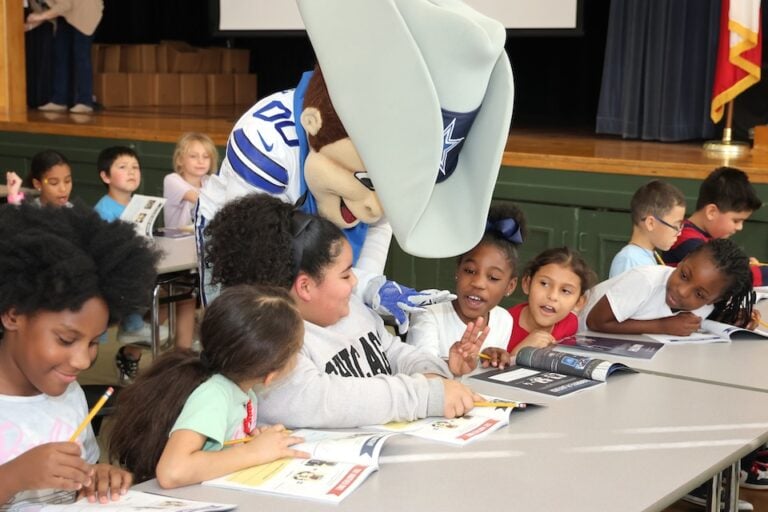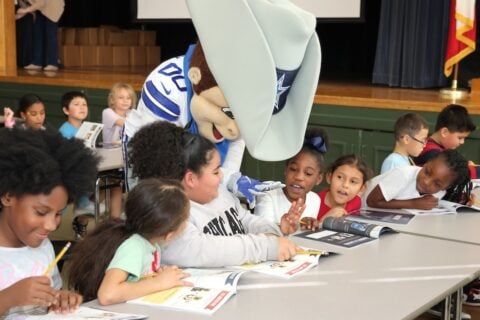Student Code of Conduct
- General Information
- Responsibilities
- Frequently Asked Questions
- Levels of Student Misbehaviors and Corrective Actions
- Assignments and Appeal Processes for DAEP Placements and Expulsions
- Student Dress Code
- Technology Regulation
- Volunteer Guidelines
- Assistance for Students with Learning Differences
- Extracurricular Activities
- Arlington ISD Departmental Supports
- Drug and Alcohol Counseling Options
- Attendance
- Threat Assessments
- School Safety Transfers
- Notices
- Definitions
RESPONSIBILITIES
The Arlington Independent School District strives to provide a safe, positive, and educationally-oriented environment in each of its schools. All students and their family members share a responsibility to support this goal so that all may benefit from the services provided by the district. A spirit of cooperation is a must if a quality education and effective discipline are to be a reality. The responsibilities of students, parents and the district are defined as follows:
STUDENT RESPONSIBILITIES:
- Students of Arlington Independent School District have a responsibility to cultivate excellence in their academic and civic pursuits. This may be achieved through:
- Attending school every day and working hard to master the skills and knowledge shared by your teachers and other instructional staff;
- Arriving to all classes on time with assigned work and appropriate materials;
- Practicing self-discipline, setting individual goals, and utilizing good work habits to meet personal and educational expectations, and;
- Taking ownership of learning by engaging in extracurricular and co-curricular activities that enhance and promote academic achievement (e.g., school clubs/organizations, fine arts, UIL athletics, UIL academics, work programs and community involvement).
- Students have a responsibility to show consideration for the physical, social, and emotional well-being of others. At a minimum, this may be demonstrated by:
- Showing respect for others and their property;
- Using kind and courteous language and refraining from making profane, insulting, threatening, or inflammatory remarks;
- Expressing opinions and ideas in a thoughtful, respectful, and civil manner, and;
- Not coming to school if you are exhibiting one or more of the exclusionary descriptors listed at the Arlington ISD Health Services Department.
- Students have a responsibility to conduct themselves in a respectful and honorable manner while at school and at all school-related activities or events. This includes:
- Cooperating with all lawful and reasonable directives issued by school personnel;
- Establishing and maintaining effective working relationships with parents, peers, and school personnel;
- Seeking changes in school policies and regulations through approved channels in an orderly and responsible manner;
- Assuming responsibility for making choices and accepting consequences for your behaviors, and;
- Reporting inappropriate behavior to school officials in a timely manner.
- Students have a responsibility to act in accordance with district and school expectations and procedures. This includes:
- Following all district, school, bus, and classroom expectations;
- Adhering to the school dress code;
- Complying with all safety protocols;
- Remaining in assigned areas until dismissed, and leaving when directed;
- Following all safety and discipline procedures while on the bus and/or in bus zones, using caution at all times to ensure the safety of themselves, their peers, and the bus drivers. Some examples of safe bus behavior include:
- Standing away from roadways and vehicles while waiting for the bus;
- Waiting in clear sight of the driver until the bus comes to a complete stop before loading or unloading;
- Loading the bus one student at a time, taking their seat immediately, and wearing any safety equipment required for the individual student
- Using kind, courteous, and respectful language and speaking quietly on the bus;
- Following the directions of the bus driver and/or driver’s assistant in a prompt and respectful manner.
- Reviewing and acknowledging receipt of the Student Code of Conduct, and seeking clarification on district and school policies as needed.
PARENT OR LEGAL GUARDIAN RESPONSIBILITIES:
- Support your child’s potential for lifelong success and maximize their ability to learn while at school. Examples of ways to support your child include but are not limited to:
- Providing the necessities of life in the home environment, including emotional encouragement, supervision, direction, and positive acknowledgement of your child’s attempts to learn new skills;
- Helping your child to learn and practice social and emotional skills that help them build and maintain positive relationships, treat staff with respect, resolve conflicts without violence, and participate effectively in instruction;
- Helping your child come to school every day on time and properly attired, and promptly notifying the school to explain any absences or tardies;
- Providing a quiet space free of distractions for your child to study at home, providing structure and positive encouragement to develop strong study habits, and helping your child participate in school tutorials as the need arises, and;
- Not sending your child to school if they meet the exclusionary guidelines listed at the Arlington ISD Health Services Department.
- Work with teachers and school and district administrators to provide a safe, positive, and educationally-oriented school environment. This can be achieved by:
- Maintaining regular, open communication with your child’s teachers, support staff, and administrators, which includes sharing your up-to-date addresses, phone numbers, and email addresses with the school office so that you may be reached if your child has an emergency;
- Ensuring your child’s safety by adhering to appropriate drop-off and pick-up times and providing appropriate identification when requested by school personnel;
- Obtaining state-required immunizations to protect your child and their peers from preventable diseases, keeping your child home when ill, and following procedures for administration of medication at school;
- Reviewing the Student Code of Conduct with your child, helping them to understand how expectations for their behavior at school is related to your expectations for their behavior at home, and signing the Student and Parent Acknowledgement Statement with your child;
- Reporting concerns of inappropriate conduct in a timely manner, and;
- Working with teachers and/or school administrators to teach your child an alternative way to handle the situation that would result in a more productive and/or positive outcome if a disciplinary incident were to occur.
- Show your child that you are interested in their education and talk with their teacher(s) to learn how you can support their success. There are many ways to show your children that you care about their education, including:
- Discussing work assignments and school activities with your child, and help them understand how their education and their teachers can help them achieve their goals in life;
- Using the Parent Self-Serve online application to view your child’s academic progress and attendance;
- Emailing or requesting a conference with your child’s teacher(s) if you see that they are struggling with a subject;
- Making sure your child’s teachers are aware of any learning difficulties or other conditions that may impact their ability to actively participate in their school activities, and;
- Treating teachers as your partners in your child’s education. Respond positively to their attempts to communicate with you, attend conferences, and share your expertise on your child to discover strategies that will maximize their success.
SCHOOL PERSONNEL RESPONSIBILITIES:
- Discover the positive qualities, academic strengths, and personal interests of each of their students, and identify how these traits can be used to maximize students’ success. There are many ways to accomplish this, including:
- Showing respect for students and their property;
- Using kind and courteous language and refraining from making profane, insulting, threatening, or inflammatory remarks;
- Expressing opinions and ideas in a thoughtful, respectful, and civil manner;
- Taking time to talk with your student and asking about their personal interests, and;
- Getting to know the student’s family members and enlisting their expertise to support the student’s academic, social, and emotional development.
- Establish regular, positive communication with students and their families. At a minimum, this includes:
- Communicating promptly with parents or guardians, including contacting them when there is a change in a student’s performance, when an improvement is not sustained, when you have a concern about a student, or when parents inquire about their child;
- Participating in campus activities that promote parent and/or student involvement;
- Working collaboratively with students, parents, and other district professionals to solve problems at the classroom level, and;
- Disseminating grading procedures and classroom expectations to students and parents at the beginning of each semester.
- Teach students skills that enable them to become life-long learners. This includes but is not limited to:
- Effective study habits, organization, and planning skills;
- Emotional regulation skills to help students become receptive to learning and discipline, and;
- Self-management skills to help students establish goals, set limits, and choose options effectively.
- Conduct themselves in a respectful and honorable manner while at school and at all school-related activities or events. This includes:
- Following state laws as well as district policies and regulations, and;
- Abiding by the Code of Ethics as approved by the Texas Education Agency.
Following the expectations and regulations established by the school and district as stated in the Campus Discipline Management Plan.








